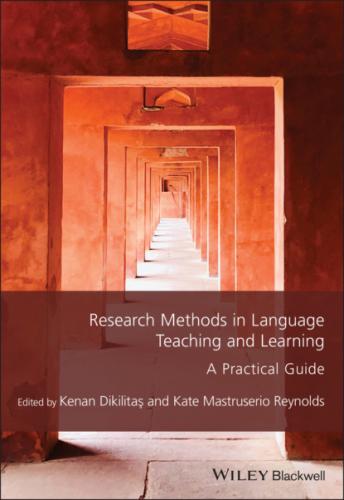The research had democratic validity, because the researcher and the teacher worked collaboratively in designing classes based on the data collected from students. It also had process validity since the research process lasted a term. Catalytic validity was relevant to the research topic because student negotiation encouraged participants to be critical about the usefulness of class designs and reflect on their engagement in speaking activities. Dialogic validity was also fulfilled in the study as the research was carried out under the supervision of two specialists.
Conclusions
This chapter addressed a number of significant issues that need to be taken into account when designing a study that attempts to improve classroom practice. The research described shows that it was possible to implement student negotiation in an EFL speaking class. Following an action research methodology enabled several interventions and collecting systematic data on the effectiveness of these interventions. These led to improvement in the research interventions, and hence, classroom practice. Investigating an under-researched area (i.e., student-negotiated EFL speaking class) necessitated building theory from the data. Therefore, grounded theory was used to design the research procedure, which led the researcher to a theoretical understanding of the influence of student-negotiation on a variety of factors that are likely to improve learners’ EFL speaking competence.
Although the findings revealed several positive outcomes related to the role of student negotiation in EFL speaking classes, the study did not test whether it contributed to students’ speaking competence. A focus on this issue would make the research more productive in terms of exploring the benefits of student-negotiated speaking classes. This requires collecting data for a longer period of time, because it is difficult to improve learners’ speaking competence in a limited period. It would also be useful to follow experimental methodology to test whether there was a causal relationship between student-negotiation and EFL speaking competence.
This study served one of the significant objectives of educational research, which is improving classroom practice. I believe that educational research studies that are unable to generate practical implications for improving classroom practice are of little value. To avoid this, educational research should be concerned with designing studies that are likely to offer some useful ways for improving education. In doing so, it is important to consider instructional problems that students and teachers encounter in their learning and teaching processes. This could make it possible to address major issues in education in any particular context.
Designing qualitative research requires the researcher to make judgements based on their subjective perspective which might influence the trustworthiness of the research. To improve trustworthiness, rather than using only qualitative content analysis, which could lead to just a descriptive understanding of the situation, it may be more useful to follow systematic procedures such as those offered by grounded theory. Grounded theory proposes essential steps that should be followed to generate a theory based on the data. In my dissertation, grounded theory enabled me to follow a systematic research procedure and generate theoretical hypothesis, which led to identifying implications for teaching and learning EFL speaking.
Questions for the Reader
1 What are distinctive features of grounded theory?
2 What are some important benefits of using grounded theory in educational research?
3 What is triangulation and why is it important?
Acknowledgments
I would like to thank Dr. Jill Cadorath and Dr. Nigel Skinner for reviewing and proofreading an earlier version of the chapter.
Suggested Readings
1 Birks, M., & Mills, J. (2015). Grounded theory: A practical guide. Sage Publications.
2 Charmaz, K. (1996). The search for meaning – Grounded theory. In J. A. Smith, R. Harré, & L. Van Langenhove (Eds.), Rethinking methods in psychology (pp. 27–49). Sage Publications.
References
1 Ali, A., Tariq, R. H., & Topping, K. J. (2009). Students’ perception of university teaching behaviors. Teaching in Higher Education, 14(6): 631–647. https://doi.org/10.1080/13562510903315159
2 Aloreibi, A., & Carey, M. D. (2017). English language teaching in Libya after Gaddafi. In R. Kirkpatrick (Ed.), English language education policy in the Middle East and North Africa (pp. 93–114). Springer.
3 Bailey, K. D. (1994). Methods of social research (4th ed.). The Free Press.
4 Bassey, M. (1998). Action research for improving educational practice. In R. Halsall (Ed.), Teacher research and school improvement: Opening doors from the inside (pp. 93–108). Open University Press.
5 Birks, M., & Mills, J. (2015). Grounded theory: A practical guide. Sage.
6 Brown, A., & Dowling, P. (1998). Doing research/Reading research. Falmer Press.
7 Burns, A. (1999). Collaborative action research for English language teachers. Cambridge University Press.
8 Burns, A. (2010a). Doing action research in English language teaching: A guide for practitioners. Routledge.
9 Burns, A. (2010b). Action research. In B. Paltridge & A. Phakiti (Eds.), Continuum companion to research methods in applied linguistics (pp. 80–97). Continuum.
10 Charmaz, K. (2006). Constructing grounded theory: A practical guide through qualitative analysis. Sage.
11 Clarke, D. F. (1991). The negotiated syllabus: What is it and how is it likely to work? Applied Linguistics, 12(1), 13–28. https://doi.org/10.1093/applin/12.1.13
12 Cohen, L., Manion, L., & Morrison, K. (2007). Research methods in education (6th ed.) Routledge.
13 Cook, D. L. (1962). The Hawthorne effect in educational research. The Phi Delta Kappan, 44(3), 116–122.
14 Crotty, M. (1998). The foundations of social research. Sage.
15 Denzin, N. K. (1970). The research
